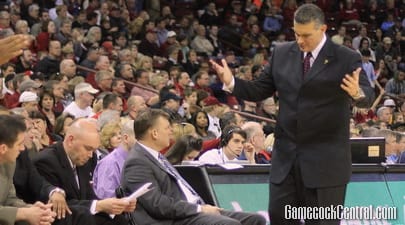Criticism of SEC hoops angers Martin

Frank Martin grasps the irony in the widespread condemnation of SEC basketball.
The SEC has won three national championships in the past eight seasons, six in the past 20 years by three different programs (Kentucky, Florida and Arkansas), more than any other conference.
Advertisement
Yet, Martin asserts, he's frequently asked what's wrong with the league and what's the best avenue for improving the SEC's product in order to climb back among the best conferences in the country.
Martin's short response: Nothing.
"I'm tired of hearing about the SEC becoming a better product," Martin said last week during the SEC's spring meetings in Destin, Fla. "The league has won three national championships in less than a decade. Yet, I keep hearing the SEC is no good. I'm tired of listening to that nonsense.
"The SEC is fine. It's a league in transition. There are so many first- and second-year coaches in the league. They're trying to get their program going. There is nothing wrong with the product of the league."
Nonetheless, Martin understands the backlash against the SEC this past season was based largely on the weak non-conference schedules put together by most of the league's schools and the sad reality that the conference's flagship program (Kentucky) failed to earn an at-large berth into the NCAA tournament, and embarrassingly lost to Robert Morris in the first round of the NIT.
Commissioner Mike Slive, who admitted the SEC had a "bad year" in men's basketball in 2012-13, and consultant Greg Shaheen, formerly the NCAA's director of championships, delivered a stern message during two days of meetings with the coaches in Destin.
Getting just three of 14 teams into the Big Dance is unacceptable, and everything begins (and perhaps ends) with scheduling tougher non-conference opponents. And beating them.
Shaheen has been hired by the league as a scheduling consultant.
"We, the coaches, probably have to do a better job of scheduling," Martin said. "I can only speak for my school, but we hurt our league this year with the non-conference schedule we played. That can't happen. I have control of that now. That never happened under my watch at K-State and it's not going to happen at South Carolina anymore."
Hence, wave goodbye to non-conference opponents such as Rider, Elon, Morgan State and Presbyterian. Victories over lower echelon teams fail to boost the RPI from both a school and conference perspective. Fair or not, they often inflict more damage than good.
Which is why each SEC school has agreed to send its tentative non-conference schedule to the league office for analytical review and feedback. In some situations, Slive could reject the schedule and send it back with an order to tweak it.
"The coaches are 100 percent on board," Martin said. "We understand that we have to do a better job of scheduling. We get it. There's no doubt about it. If you schedule teams that have a (No.) 330 RPI and you schedule teams that have a (No.) 230 RPI, at the end of the day it makes a huge difference on your RPI, your league's RPI and the RPI for the other teams in your league.
"When you beat a team with a 230 (RPI), that's not viewed as a good win. When it's NCAA tourney time, it still impacts the league, but a lot better than if you beat a team that's 330. As long as we're going to rely on computers to make part of the decision and not the human element, then you have to make your number look good because all the computer does is read numbers."
Martin appreciated Shaheen's in-depth presentation on how the schools - and the conference - can bolster their RPI and greatly increase the odds of getting five or six teams into the tournament.
"It was awesome," Martin said. "When you can get the guy that spearheaded that tournament for so long and he can give you the in-depth detail of what goes on in that (tournament selection committee) room in order to best prepare you for preparing your team and your league in scheduling to put everybody into that tournament, it was impressive. I was ecstatic."
In order to enhance USC's non-conference slate in 2013-14, Martin agreed to play at Oklahoma State on Dec. 6 as part of the Big 12/SEC Challenge. Martin, of course, is very familiar with the venue in Stillwater, Okla., based on his five years as coach at Kansas State.
"It's one of the toughest places in the country to play," Martin said. "Go back and look at their home record for the past 12 to 14 years. It's ridiculous. It's nearly impossible to win there, but it's a great environment and it will be a great game. They are possibly a top-five team in the country."
Besides weak non-conference schedules acting as a ball and chain, some analysts speculate the SEC's reputation for playing a tough, physical brand of basketball with rampant fouling is damaging the league's perception nationally as well. Martin, though, swats away that assertion.
"You can't foul," Martin insisted matter of factly. "If you foul, they're going to call it. There's a difference between playing physical and fouling. Those are two different animals. The rules are written a certain way and when you violate them you should be called for fouls. Simple as that.

If you have any questions about this feature or wish to discuss it, please visit The Insiders ForumClick "I hear all these things about this league or that league being more physical. There are reasons there are officials. They call the game the way the rules are interpreted. I don't see why we should change anything." Here to view this Link., Gamecock Central's members-only message board for Gamecock fans.